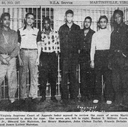New York Times
By FRANCIS X. CLINES
RICHMOND, Va., Sept. 6 — Lawyers for Earl Washington Jr., a model prisoner with the mental development of a 10-year-old, filed a petition today for a full pardon after 17 years in prison, 6 years after a DNA test raised strong doubts about his conviction in a rape and homicide.
Even as the petition was filed, the lawyers were awaiting results of a more definitive DNA test that they said in the petition they were certain would clear Mr. Washington of the crimes.
The new DNA test was ordered by the governor in the spring. Though Mr. Washington’s lawyers maintain that the test usually takes a month or less to complete, a spokesman for the governor said the test was not concluded.
His lawyers, who specialize in the increasingly successful DNA challenges of criminal convictions, describe Mr. Washington as an amiable, passive farmhand with an I.Q. of 69 who has a weakness for agreeing with authority figures. They maintain his case is a summary of the main problems prompting the rising national concern about fairness in capital convictions: race, mental incapacity, prosecutions based solely on confessions, appeal limitations and the inevitable pressures of politics.
Mr. Washington was only days from execution in 1994 when his death sentence was commuted to life by former Gov. L. Douglas Wilder, a Democrat, after the initial DNA test. That test raised the possibility that someone else might have been involved in the crime, but state officials insisted it was not conclusive. Mr. Washington accepted the offer of life without parole, but a battery of lawyers has continued to fight to overturn his conviction.
“Earl’s case has it all, beginning with bad lawyering and a false confession,” said Barry C. Scheck, a professor at the Benjamin N. Cardozo School of Law at Yeshiva University, who is co-director of the Innocence Project, a pro bono DNA defense program.
Defense lawyers expressed concern that Gov. James S. Gilmore III, a Republican close to Gov. George W. Bush of Texas, the Republican presidential candidate, might choose to “split the baby” politically and keep Mr. Washington in prison as part of a 30-year sentence in an assault case not connected to the murder. Typically, the assault conviction by itself would have merited parole by now, they noted.
“That’s a ridiculous and unsubstantiated thing to say,” Governor Gilmore’s spokesman, Mark A. Miner, said in rejecting any suggestion that politics was a factor in the case. He noted that Mr. Gilmore had ordered the new DNA test in the first place. “The governor takes each petition very seriously and personally reviews the details,” Mr. Miner said.
Mr. Washington was convicted of raping and murdering Rebecca L. Williams, a 19-year-old mother of two, in Culpeper, Va., in 1982. During years of legal criticism, police and prosecutors have defended their methods, noting that a federal appeals court upheld the conviction in 1991. The court did so while finding that Mr. Washington was “easily led” by the police and that the prosecution evidence — the confession — presented “difficulties for any fair- minded jury.”
The Culpeper police chief, C. B. Jones, who headed the Williams investigation, emphasized that it was a jury, not the police, who found Mr. Washington guilty. “Even if he didn’t do the rape, there’s still a possibility he did the other,” Mr. Jones said when asked about the latest DNA appeal.
The police began questioning Mr. Washington about the unsolved murder and three other sexual assaults when he was arrested in 1983 after a drunken family dispute in which he assaulted a neighbor. Agreeing to waive his right to a lawyer, Mr. Washington initially confessed to all four unsolved crimes, but three of the inquiries were later dropped when evidence and witnesses contradicted his confessions. “I guess I told them what they wanted to hear,” Mr. Washington said in an interview this summer at Keen Mountain Correctional Center in southern Virginia. “I didn’t commit the murder,” he added. When asked why he confessed, Mr. Washington was almost inaudible as he answered with a smile and a shrug, “I don’t know.”
His conviction was based on a confession constructed of one-word “yes” answers to a series of leading questions. The transcript showed detectives repeatedly correcting, if not coaching, Mr. Washington when he offered erroneous details, such as misidentifying the crime scene, confessing at first to stabbing the victim twicewhen her body bore 38 wounds, and identifying the victim as black.
Mr. Washington, a 40-year-old black man, quickly corrected himself when contradicted. “Well that’s wrong, Earl, she was white,” a detective informed him about the victim after one crucial answer, according to the interrogation transcript that appeal lawyers underlined after his conviction.
“Oh, she was white,” Mr. Washington amended.
“You can get Earl Washington to agree he shot President Kennedy or did just about anything else,” said Eric M. Freedman, a professor at Hofstra University. He has helped Mr. Washington across 15 years of court and executive appeals, arguing that his retardation was exploited repeatedly in the criminal justice system.
Mr. Washington’s original defense did not challenge the confession or bring to light serology evidence that no trace of the defendant was found on a blanket used in the rape and homicide. The lawyers who later took up his cause emphasized that their task was greatly burdened by the fact that Virginia has one of the most restrictive appeal procedures in the nation, allowing only 21 days after sentencing to present new evidence. In contrast, the most liberal states set no time limit.
“This necessarily politicizes the appeal process by leaving it solely in the governor’s hands,” said Peter Neufeld, co-director of the Innocence Project. Mr. Neufeld conceded that part of the reason for making the pardon petition public was to openly press the governor to reject keeping Mr. Washington in prison solely for an assault conviction.
The new DNA test is more sophisticated than the original in being able to check at least 13 genetic markers for a possible match rather than the single marker studied six years ago.
In the last nine years, there have been 67 DNA exonerations of inmates across the country. Of these, one in 5 involved convictions based solely on confessions, said the Innocence Project, which was involved in 41 of the 67 exonerations.
Before DNA was used as an appeals tool, Virginia was the first state in the nation to use genetic technology in creating a DNA identity bank to which state felons are required to provide blood samples. The decade-old program contains more than 120,000 samples and has been used to find suspects who matched DNA evidence in about 30 killings and more than 150 other crimes.
In their optimism, Mr. Washington’s lawyers have speculated that the DNA bank might be powerful enough now to identify another party as Mrs. Williams’s murderer, providing Mr. Gilmore with a dramatic outcome for the Washington case.



